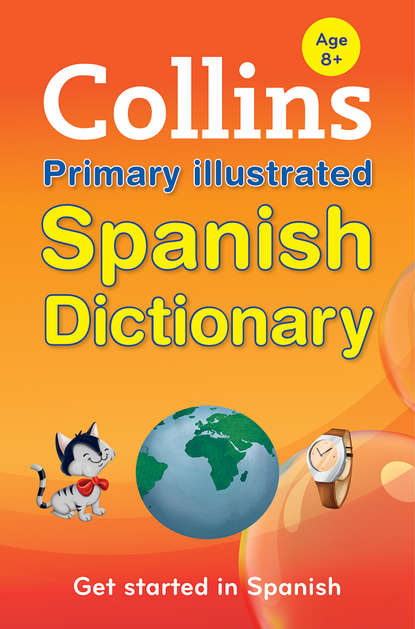
Полная версия:
Collins Primary Dictionaries
cuándo ADVERB
when ¿Cuándo te va mejor? When suits you? No sabe cuándo ocurrió. He doesn’t know when it happened.
cuanto (FEM cuanta) ADJECTIVE, PRONOUN
Termínalo cuanto antes. Finish it as soon as possible. Cuanto más lo pienso menos lo entiendo. The more I think about it, the less I understand it. Cuantas menos personas haya mejor. The fewer people the better. En cuanto oí su voz me eché a llorar. As soon as I heard his voice I began to cry. Había sólo unos cuantos invitados. There were only a few guests.
en cuanto a as for
cuánto (FEM cuánta) ADJECTIVE, PRONOUN
1 how much ¿Cuánto dinero tienes? How much money do you have? Me dijo cuánto costaba. He told me how much it was.
2 how many ¿Cuántas sillas? How many chairs? No sé cuántos necesito. I don’t know how many I need. ¿A cuántos estamos? What’s the date? ¡Cuánta gente! What a lot of people! ¿Cuánto hay de aquí a Bilbao? How far is it from here to Bilbao? ¿Cuánto tiempo llevas estudiando inglés? How long have you been studying English?
cuarenta (FEM cuarenta) ADJECTIVE, PRONOUN
forty Tiene cuarenta años. He’s forty.
cuarto
cuarto can be an adjective, pronoun or noun.
A (FEM cuarta) ADJECTIVE, PRONOUN
fourth Vivo en el cuarto piso. I live on the fourth floor.
B MASC NOUN
1 room Los niños jugaban en su cuarto. The children were playing in their room. el cuarto de estar the living room el cuarto de baño the bathroom
2 quarter un cuarto de hora a quarter of an hour
Son las once y cuarto. It’s a quarter past eleven. A las diez menos cuarto. At a quarter to ten.
cuatro (FEM cuatro) ADJECTIVE, PRONOUN
four
Son las cuatro. It’s four o’clock. el cuatro de julio the fourth of July Nació el cuatro de julio. He was born on the fourth of July.
cuatrocientos (FEM cuatrocientas) ADJECTIVE, PRONOUN
four hundred
cubierto
cubierto can be an adjective or part of the verb cubrir.
A (FEM cubierta) ADJECTIVE
covered Estaba todo cubierto de nieve. Everything was covered in snow.
B VERB ▷see cubrir Ha cubierto el piano con una lona. He’s covered the piano with a tarpaulin.
los cubiertos NOUN
cutlery
el cubito de hielo NOUN
ice-cube
el cubo NOUN
bucket el cubo y la pala the bucket and spade el cubo de la basura the dustbin
cubrir VERB
to cover Tenemos que cubrir los cuadernos. We have to cover our exercise books. El agua casi me cubría. I was almost out of my depth.
la cuchara NOUN
spoon
la cucharada NOUN
spoonful una cucharada de jarabe a spoonful of syrup
la cucharilla NOUN
teaspoon
cuchichear VERB
to whisper
el cuchillo NOUN
knife
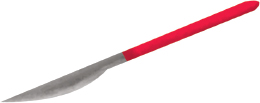
el cucurucho NOUN
cone
cuelgo VERB ▷see colgar ¿Dónde cuelgo el abrigo? Where can I hang the coat?
el cuello NOUN
neck
la cuenta NOUN
1 bill El camarero nos trajo la cuenta. The waiter brought us the bill.
2 account una cuenta de correo an email account darse cuenta to realize/to notice
Language tip
darse cuenta has two meanings. Look at the examples.
Perdona, no me di cuenta de que eras vegetariano. Sorry, I didn’t realize you were a vegetarian. ¿Te has dado cuenta de que han cortado el árbol? Did you notice they’ve cut down that tree?
cuento
cuento can be an adjective or part of the verb contar.
A MASC NOUN
story La abuela nos contaba cuentos. Grandma used to tell us stories. un cuento de hadas a fairy-tale
B VERB ▷see contar Si quieres te cuento lo que pasó. If you want, I’ll tell you what happened.
la cuerda NOUN
1 rope Le ataron las manos con una cuerda. They tied his hands together with a rope.
2 string Necesito una cuerda para atar este paquete. I need some string to tie up this parcel.
el cuero NOUN
leather una chaqueta de cuero a leather jacket
el cuerpo NOUN
body el cuerpo humano the human body el cuerpo de bomberos the fire-brigade
cuesta
cuesta can be an adjective or part of the verb costar.
A FEM NOUN
slope una cuesta muy empinada a very steep slope
ir cuesta abajo to go downhill ir cuesta arriba to go uphill
B VERB ▷see costar ¿Cuánto cuesta esa bicicleta? How much does that bicycle cost?
la cueva NOUN
cave
el cuidado NOUN
care Conducía con cuidado. He was driving carefully.
¡Cuidado! Careful!
cuidar VERB
to look after Ella cuida de los niños. She looks after the children.
■ cuidarse to look after oneself Tienes que cuidarte. You need to look after yourself.
¡Cuídate! Take care!
la culpa NOUN
fault La culpa es mía. It’s my fault. Siempre me echan la culpa a mí. They’re always blaming me.
culpable
culpable can be an adjective or a noun.
A (FEM culpable) ADJECTIVE
guilty Yo no soy culpable. I’m not guilty.
B MASC/FEM NOUN
culprit Ella es la culpable de todo. She is to blame for everything.
la cultura NOUN
culture
la cumbre NOUN
summit
el cumpleaños (PL los cumpleaños) NOUN
birthday
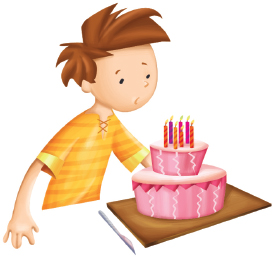
¡Feliz cumpleaños! Happy birthday!
cumplir VERB
1 to carry out
2 to keep Mañana cumplo dieciséis años. I’ll be sixteen tomorrow.
la cuna NOUN
cradle
la cuñada NOUN
sister-in-law
el cuñado NOUN
brother-in-law
cupo VERB ▷see caber No cupo por la puerta. It wouldn’t go through the door.
el cura NOUN
priest
curar VERB
1 to cure un remedio para curar una pulmonía a treatment to cure pneumonia Espero que te cures pronto. I hope that you get better soon.
2 to heal Ya se le ha curado la herida. His wound has already healed.
cursi (FEM cursi) ADJECTIVE
1 affected
2 twee
el cursillo NOUN
course un cursillo de informática a computer course hacer un cursillo de natación to have swimming lessons
el curso NOUN
1 year un chico de mi curso a boy in my year Hago segundo curso. I’m in Year two.
2 course Hice un curso de alemán. I did a German course.
la curva NOUN
bend Hay algunas curvas muy cerradas. There are some very sharp bends.
D d
la dama NOUN
lady damas y caballeros ladies and gentlemen las damas draughts jugar a las damas to play draughts
el daño NOUN
damage El daño producido no es muy grave. The damage isn’t very serious. ¡Me estás haciendo daño! You’re hurting me!
hacerse daño to hurt oneself
dar VERB
to give Se lo di a Teresa. I gave it to Teresa. Se me dan bien las ciencias. I’m good at science.
de PREPOSITION
Language tip
de + el = del.
1 of un paquete de caramelos a packet of sweets un vaso de agua a glass of water las clases de inglés English lessons un anillo de oro a gold ring la casa de Isabel Isabel’s house
2 from Soy de Madrid. I’m from Madrid. una carta de mi tía a letter from my aunt Son del año pasado. They’re from last year.
3 than Es más difícil de lo que creía. It’s more difficult than I thought.
dé VERB ▷see dar Quiero que me dé el móvil. I want him to give me the mobile phone.
debajo ADVERB
underneath Levanta la maceta, la llave está debajo. Lift up the flowerpot, the key’s underneath. debajo de under debajo de la mesa under the table
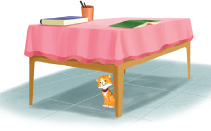
deber
deber can be a noun or a verb.
A MASC NOUN
duty Sólo cumplí con mi deber. I simply did my duty. los deberes homework
B VERB
1 must Debo intentarlo. I must try it. No debes preocuparte. You mustn’t worry. No deberías haberla dejado sola. You shouldn’t have left her alone. deber de must Debe de ser canadiense. He must be Canadian.
2 to owe ¿Cuánto le debo? How much do I owe you?
hacer los deberes to do one’s homework
débil (FEM débil) ADJECTIVE
weak
decidir VERB
to decide Tú decides. You decide. Me decidí a aprender inglés. I decided to learn English. ¡Decídete! Make up your mind!
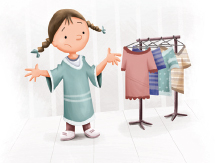
décimo (FEM décima) ADJECTIVE, PRONOUN
tenth Vivo en el décimo. I live on the tenth floor.
decir VERB
1 to say ¿Qué dijo? What did he say? ¿Cómo se dice ‘casa’ en inglés? How do you say ‘casa’ in English? No sé lo que quiere decir. I don’t know what it means.
2 to tell Nunca me dice la verdad. He never tells me the truth. Me dijo que esperara fuera. He told me to wait outside.
es decir that’s to say ¡No me digas! Really?
el dedo NOUN
1 finger
2 toe el dedo gordo the thumb/the big toe
Language tip
el dedo gordo has two meanings. It can be translated as the thumb or the big toe.
dejar VERB
1 to leave He dejado las llaves en la mesa. I’ve left the keys on the table. No me dejes sola. Don’t leave me on my own.
2 to let Mis padres no me dejan salir de noche. My parents won’t let me go out at night. dejar caer to drop Dejó caer la bandeja. She dropped the tray.
3 to lend Le dejé mi libro de matemáticas. I lent him my maths book. dejar de to stop He dejado de morderme las uñas. I’ve stopped biting my nails.
del PREPOSITION ▷see de Vengo del colegio. I’m coming from school.
delante ADVERB
in front Siéntate delante. You sit in front. la parte de delante the front de delante front la rueda de delante the front wheel Se inclinó hacia delante. He leaned forward. delante de in front of/opposite
Language tip
delante de has two meanings. Look at the examples.
No digas nada delante de Anna. Don’t say anything in front of Anna. Mi casa está delante de la escuela. My house is opposite the school.
delgado (FEM delgada) ADJECTIVE
thin Estás muy delgado. You’re too thin.
demás
demás can be an adjective or a pronoun.
A (FEM demás) ADJECTIVE
other los demás niños the other children
B PRONOUN
los demás the others lo demás the rest Yo limpio las ventanas y lo demás lo limpias tú. I’ll clean the windows and you clean the rest.
demasiado
demasiado can be an adjective or an adverb.
A (FEM demasiada) ADJECTIVE
too much demasiado tiempo too much time demasiados libros too many books

B ADVERB
too much Hablas demasiado. You talk too much. Es demasiado pesado para levantarlo. It’s too heavy to lift. Caminas demasiado deprisa. You walk too quickly.
el dentífrico NOUN
toothpaste
el/la dentista NOUN
dentist Mi madre es dentista. My mum is a dentist.
dentro ADVERB
inside ¿Qué hay dentro? What’s inside? dentro de in Mételo dentro del sobre. Put it in the envelope. dentro de tres meses in three months por dentro inside Mira bien por dentro. Have a good look inside. Está aquí dentro. It’s in here.
dentro de poco soon
depender VERB
depender de to depend on El precio depende de la calidad. The price depends on the quality.
Depende. It depends.
el deporte NOUN
sport No hago mucho deporte. I don’t do much sport.
deportista
deportista can be an adjective or a noun.
A (FEM deportista) ADJECTIVE
sporty
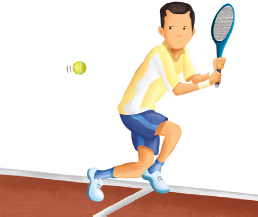
Alicia es poco deportista. Alicia is not very sporty.
B MASC NOUN
sportsman
C FEM NOUN
sportswoman
deprisa ADVERB
quickly Acabaron muy deprisa. They finished very quickly. Lo hacen todo deprisa y corriendo. They do everything in a rush.
¡Deprisa! Hurry up!
la derecha NOUN
1 right hand Escribo con la derecha. I write with my right hand.
2 right doblar a la derecha to turn right a la derecha on the right Coge la segunda calle a la derecha. Take the second turning on the right.
derecho
derecho can be an adjective, an adverb or a noun.
A (FEM derecha) ADJECTIVE
1 right Escribo con la mano derecha. I write with my right hand.
2 straight ¡Ponte derecho! Stand up straight!
B ADVERB
straight Siga derecho. Carry straight on.
C MASC NOUN
right los derechos humanos human rights
¡No hay derecho! It’s not fair!
desagradable (FEM desagradable) ADJECTIVE
unpleasant un olor muy desagradable a very unpleasant smell Fuiste muy desagradable con tu prima. You were really nasty to your cousin.
desaparecer VERB
to disappear La mancha ha desaparecido. The stain has disappeared.
el desastre NOUN
disaster La función fue un desastre. The show was a disaster. Soy un desastre para la gimnasia. I’m hopeless at gymnastics.
desayunar VERB
1 to have breakfast Nunca desayuno. I never have breakfast.
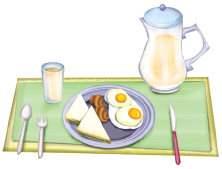
2 to have … for breakfast Desayuné café con leche y un bollo. I had coffee and a roll for breakfast.
el desayuno NOUN
breakfast
descalzarse VERB
to take one’s shoes off Descálzate. Take your shoes off.
descalzo (FEM descalza) ADJECTIVE
barefoot Paseaban descalzos por la playa. They walked barefoot along the beach. No entres en la cocina descalzo. Don’t come into the kitchen in bare feet.
descansar VERB
to rest Tienes que descansar. You must rest.
el descanso NOUN
1 rest He caminado mucho, necesito un descanso. I’ve done a lot of walking, I need a rest.
2 break Cada dos horas me tomo un descanso. I have a break every two hours.
descarado (FEM descarada) ADJECTIVE
cheeky ¡No seas descarado! Don’t be cheeky!
descargar VERB
to download
■ descargarse to go flat
desconectar VERB
to unplug
el descubrimiento NOUN
discovery
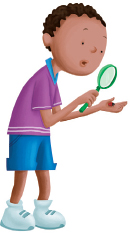
desde PREPOSITION
1 from Desde Burgos hasta mi casa hay treinta kilómetros. It’s thirty kilometres from Burgos to my house.



